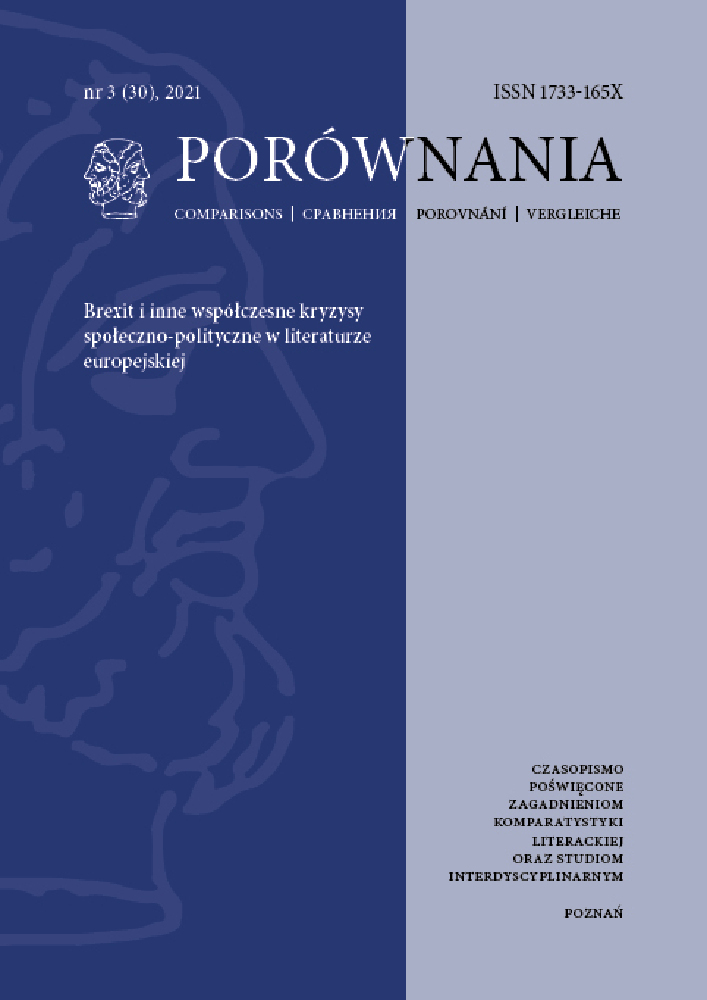Abstrakt
Although it would be absurd to compare the 2016 Brexit referendum and whatever happened in its aftermath to the tragedy of the Great War, surprising as it may seem, the two have something in common. This is so because the 1914–1918 period triggered a flood of poetry, written not only by established literary figures, but also by thousands of civilians who found it a means of expressing their emotions. By the same token, the post-referendum years produced a poetic response on the part of ordinary citizens. This article tries to take a closer look at how once again British citizens turn to poetry to voice their fears and frustration.
Reference
Allardice, Lisa. “Interview: Carol Ann Duffy.” The Guardian 27 Oct 2018.
Allesio, Sara. Reading Brexit Through BrexLit: Fictional Responses to Political Crisis, 2020, http://amsdottorato.unibo.it/9427/. Accessed 07 April 2021.
Anaxagorou, Anthony. After the Formalities. London: Penned in the Margins, 2019.
Anne Varty. “Poetry and Brexit.” Brexit and Literature: Critical and Cultural Responses. Ed. Robert Eaglestone. Abingdon: Routledge, 2018. 59–65.
Archer, Neil. Cinema and Brexit. London: Bloomsbury Academic, 2020.
Armitage, Simon. “The Brink.” www.skyartsart50.tv/projects/thebrink/. Accessed 24 March 2021.
Auden, W. H. The Collected Poetry of W. H. Auden. New York: Random House, 1945.
Bilston, Brian. “57 Varieties of Brexit.” https://brianbilston.com/2017/06/18/57-varieties-of-brexit/. Accessed 15 March 2021.
Bilston, Brian. “Brexit in Pursuit of a Bear.” https://tinyurl.com/2p45b35a. Accessed 06 March 2021.
Birdsey, Joseph. “Pencil Drawn Borders.” https://tinyurl.com/487bw2yd. Accessed 28 March 2021.
Brooke, Rupert. The Poetical Works. London: Faber and Faber, 1970.
Butters, Paul. “Brexit.” https://hellopoetry.com/words/brexit. Accessed 19 April 2021.
Clarke, David. The Europeans. Rugby: Nine Arches Press, 2019.
Colvin, Callum and Robert Crawford. Brexit Tears. Newtyle: Kettilonia, 2020.
Cosslett, Rhianon Lucy. “Brexit Poetry May not Heal our Divided Nation, but it Helps.” Guardian 7 Nov. 2019.
Crace, John. “Preface.” The Good Brexiteer’s Guide to English Lit. John Sutherland. London: Reaktion Books, 2018. 11–16.
Duffy, Carol Ann. Sincerity. London: Picador, 2019.
Dunkerley, Hugh. Kin. Blaenau Ffestiniog: Cinnamon Press, 2019.
Eaglestone, Robert, ed. Brexit and Literature: Critical and Cultural Responses. London: Routledge, 2018.
Ferguson, Donna. “Poetry Sales Soar as Political Millennials Search for Clarity.” The Guardian 21 Jan. 2019.
Flood, Alison. “Brexit Poems and Dirty Limericks: Poetry Left in Boxes Across Exmoor to Be Compiled for Book.” The Guardian 7 Sept. 2016.
Graves, Robert. The Common Asphodel: Collected Essays on Poetry 1922–1949. (1949). London: Hamish Hamilton, 1949.
Gunn, George. “The Silent Poetry of Brexit.” Bella Caledonia 31 Jan. 2019.
Hagger, Nicholas. Fool’s Paradise: The Voyage of a Ship of Fools from Europe. A Mock Heroic Poem on Brexit. Alresford: John Hunt Publishing, 2020.
Harrison, Tony. V. Newcastle upon Tyne: Bloodaxe, 1985.
Higgins, Kevin. “Exit, a Brexit Poem by Kevin Higgins.” The Irish Times 5 Dec. 2017.
Hope, Christopher. https://twitter.com/hashtag/BrexitPoems?src=hashtag_click. Accessed 03 April 2021.
Kelly, Richard T. “Brexit in Fact and Fiction.” Critical Quarterly 60.2 (2018): 74–85.
Klepuszewski, Wojciech. The Missing Chapter—Women’s Poetry of the Great War. Koszalin: Wydawnictwo Politechniki Koszalińskiej, 2006.
Lehóczky, Ágnes and Welsch, J. T., eds. Wretched Strangers: Borders Movement Homes. Norwich: Boiler House Press, 2018.
McNish, Hollie. “British National Breakfast.” https://tinyurl.com/yym26d8r. Accessed 15 March 2021.
McNish, Hollie. “Foreign.” https://derbynews.org.uk/2014/03/30/foreign-by-hollie-mcnish/. Accessed 14 March 2021.
McRae, Andrew. https://www.exeter.ac.uk/news/university/title_749467_en.html. Accessed 10 March 2021.
Meyer, Michael, ed. The Collected Poems of Sidney Keyes. London Routledge&Kegan Paul, 1945.
Mitchell, Adrian. Tell me Lies: Poems 2005–2008. Tarset: Bloodaxe, 2009.
Moran, Lee. “ Britons Turn To Poetry To Express Their Feelings On Brexit.” The Huffington Post, 26 June 2016.
Motion, Andrew. “After the EU Referendum: In the Air.” The Guardian 2 July 2016.
Murphy, Keith. K.R. Murphy: Official Site of Sometime Author & Poet, https://keithmurphy26.wixsite.com/blog. Accessed 22 March 2021.
Musiyiva, Ambrose, ed. Bollocks to Brexit: An Anthology of Poems and Short Fiction. CivicLeicester, 2019.
Normal, Henry. “Cake (A poem with layers).” https://www.northernsoul.me.uk/henry-normal-brexit-poem. Accessed 6 March 2021.
Pittel, Harald. “Fiction in Dark Times: the Brexit Novel and Ali Smith,” Hard Times 101.1 (2018): 58–67.
Powell, Anne, ed. A Deep Cry: First World War Soldier-Poets Killed in France and Flanders. Stroud: Sutton Publishing, 2000.
Ravinthiran, Vidyan. The Million-Petalled Flower of Being Here. Hexham: Bloodaxe, 2019.
Read, Jonathon. “The Telegraph Asks for Brexit Poems and It All Goes Wrong.” The New European 1 May 2018.
Riach, Alan. “Review of Brexit Tears.” The National 3 Aug 2020.
Sutherland, John, ed. The Good Brexiteer’s Guide to English Lit. London: Reaktion Books, 2018.
Taylor, Paul. “My Country; A Work in Progress, Dorfman, National Theatre, review: Carol Ann Duffy Brings a Major’s Poet’s Ear to the Music of the Text.” The Independent 13 March 2017.
Tempest, Kate (Kae). “Europe is Lost.” https://tinyurl.com/8rx3bs. Accessed 14 March 2021.
Tempest, Kate (Kae). “People’s Faces.” https://tinyurl.com/442p5b8e. Accessed 14 March 2021.
Trim. “Brexit Song Sing It (Go West).” https://allpoetry.com/poems/about/brexit. Accessed 18 April 2021.
Wheatley, David. “Poetry in the Age of Brexit.” The Irish Times 23 Jan. 2018.
Wright, Luke. “The Panel.” https://www.lukewright.co.uk/the-panel-edit/. Accessed 14 March 2021.
Licence
Utwory opublikowane w czasopiśmie „Porównania”, na platformie Pressto należącej do Uniwersytetu im. Adama Mickiewicza w Poznaniu są udostępniane na licencji Creative Commons Uznanie autorstwa - Bez utworów zależnych 4.0 Międzynarodowe (CC BY-ND 4.0)
Tym samym wszyscy zainteresowani są uprawnieni do korzystania z utworów opublikowanych pod następującymi warunkami:
-
uznania autorstwa — czyli obowiązek podania wraz z rozpowszechnianym utworem informacji o autorstwie, tytule, źródle (odnośniki do oryginalnego utworu, doi) oraz samej licencji
-
bez utworów zależnych — remiksując, przetwarzając lub tworząc na podstawie utworu, nie wolno rozpowszechniać zmodyfikowanych treści.
-
brak dodatkowych ograniczeń — nie można korzystać ze środków prawnych lub technologicznych, które ograniczają innych w korzystaniu z utworu na warunkach określonych w licencji.
Uniwersytet im. Adama Mickiewicza w Poznaniu zachowuje prawo do czasopisma jako całości (układ, forma graficzna, tytuł, projekt okładki, logo itp.).
Autor zachowuje prawa majątkowe, ale udziela zgody Uniwersytetowi im. Adama Mickiewicza w Poznaniu na wykorzystanie dzieła. Autorzy tekstów zakwalifikowanych do publikacji proszeni są o wypełnienie podpisanie i przesłanie umowa (PL) agreement (EN)
Agreement for granting a royalty-free license to works with a commitment to grant a CC sub-license





